Mark is just full of these! Thanks, Mark!
Lincoln's Wrestling Match with Jack Armstrong
Jack Armstrong's sister Elizabeth (Betsy) Armstrong married Andrew Jackson Potter's uncle, Edward Bunn Potter.
Sunday, April 08, 2007
Saturday, March 17, 2007
Bowling Green, Jr., son of Nancy Potter Green
As Mark mentioned in one of his comments, Bowling Green, Jr., the son of Nancy Potter Green, died in the Civil War. Here is a link to a site with pictures of his grave in Marietta, Georgia.
Mark, you're making me look bad with all this research you're doing! But thank you, nonetheless. And how amazing would it be to find a letter of condolence from the President! A long shot, surely, but let us know!
Mark, you're making me look bad with all this research you're doing! But thank you, nonetheless. And how amazing would it be to find a letter of condolence from the President! A long shot, surely, but let us know!
Friday, March 16, 2007
Thursday, March 15, 2007
More on Lincoln
Mark, research genealogist extraordinaire, found more information on Nancy Potter and Bowling Green, friends of Mr. Lincoln. Sounds like very close friends, in fact. Check this out! Mark, would you mind sending me the source info, so I can link it in the sidebar? Thanks, again, Mark!
(Nancy Green nee Potter, was the aunt of Andrew Jackson Potter, father to Milo Dock.)
Some of those whom Mr. Lincoln met in New Salem took a somewhat paternal interest in Mr. Lincoln. Democratic Justice of the Peace Bowling Greene was called a almost a second father to Mr. Lincoln by businessman Abner Y. Ellis and as a lending library by James Short. 7 Ellis said that Mr. Lincoln said that "he owned more to Mr Green for his advancement than any other Man."8 New Salem chronicler Thomas P. Reep wrote how Justice Greene gave Mr. Lincoln an unusual lesson in the law. The case involved ownership of a hog that was claimed by both Jack Kelso and the Trent brothers. "Lincoln, appearing for the Trent brothers, proved by three witnesses that the hog belonged to them. Kelso testified that the hog belonged to him, but he was unsupported by witnesses." To Mr. Lincoln's surprise, Greene ruled for Kelso. "Mr. Lincoln "then called the attention of the court to the rule of evidence, which required a case of fact to be determined in accordance with the greater weight of preponderance of the testimony. Green replied, 'Abe, the first duty of a court is to decide cases justly and in accordance with the truth. I know that shoat myself, and I know it belongs [to] Kelso and that the plaintiffs and their witnesses lied."9
Historian Michael Burlingame noted that "In Greene's court, Lincoln argued minor cases even before he had obtained a license. The rotund judge loved jokes, and Lincoln's sense of humor amused him vastly; he also respected the young man's intellectual ability and allowed him to peruse the law books in his small personal library. Although he was the leading Democrat in New Salem, Greene urged Lincoln, a Whig, to make his second run for the state legislature [in 1834]. A temperance advocate, Greene was a cultivated man of refined manners, and his authority as an arbiter of disputes was widely respected." 10
At Bowling Greene's Masonic funeral in 1842, Mr. Lincoln was called to give a eulogy: "He looked down a few moments at the face of his friend," wrote fellow attorney Henry Rankin. "His whole frame began trembling with suppressed emotion. He then turned and faced the friends who filled the room and crowded the doorways and stood outside around the open windows. He spoke a few words, - broken sentences only, - tremulous vibrations of the thoughts he found it impossible to coherently articulate. Tears filled his eyes. He vainly struggled to regain that self-control under which he had always held his feelings before these friends on so many occasions. He had no words that could express adequately the thoughts that thronged him as he stood beside the body of his friend whose life had been so near his, and had meant so much to him."11 At the funeral's conclusion Mr. Lincoln took Mrs. Greene on his arm and escorted her to the cemetery.
and more:
Historian Michael Burlingame wrote: "As a young legislator, he was, a colleague recalled, 'very awkward, and very much embarrassed in the presence of ladies.' A New Salem woman remembered that 'Lincoln was not much of a beau and seemed to prefer the company of the elderly ladies to the young ones.' Those more mature women included Hannah Armstrong, Nancy Green, and Mrs. Bennett Abell, who were in effect surrogate mothers."11
(Nancy Green nee Potter, was the aunt of Andrew Jackson Potter, father to Milo Dock.)
Some of those whom Mr. Lincoln met in New Salem took a somewhat paternal interest in Mr. Lincoln. Democratic Justice of the Peace Bowling Greene was called a almost a second father to Mr. Lincoln by businessman Abner Y. Ellis and as a lending library by James Short. 7 Ellis said that Mr. Lincoln said that "he owned more to Mr Green for his advancement than any other Man."8 New Salem chronicler Thomas P. Reep wrote how Justice Greene gave Mr. Lincoln an unusual lesson in the law. The case involved ownership of a hog that was claimed by both Jack Kelso and the Trent brothers. "Lincoln, appearing for the Trent brothers, proved by three witnesses that the hog belonged to them. Kelso testified that the hog belonged to him, but he was unsupported by witnesses." To Mr. Lincoln's surprise, Greene ruled for Kelso. "Mr. Lincoln "then called the attention of the court to the rule of evidence, which required a case of fact to be determined in accordance with the greater weight of preponderance of the testimony. Green replied, 'Abe, the first duty of a court is to decide cases justly and in accordance with the truth. I know that shoat myself, and I know it belongs [to] Kelso and that the plaintiffs and their witnesses lied."9
Historian Michael Burlingame noted that "In Greene's court, Lincoln argued minor cases even before he had obtained a license. The rotund judge loved jokes, and Lincoln's sense of humor amused him vastly; he also respected the young man's intellectual ability and allowed him to peruse the law books in his small personal library. Although he was the leading Democrat in New Salem, Greene urged Lincoln, a Whig, to make his second run for the state legislature [in 1834]. A temperance advocate, Greene was a cultivated man of refined manners, and his authority as an arbiter of disputes was widely respected." 10
At Bowling Greene's Masonic funeral in 1842, Mr. Lincoln was called to give a eulogy: "He looked down a few moments at the face of his friend," wrote fellow attorney Henry Rankin. "His whole frame began trembling with suppressed emotion. He then turned and faced the friends who filled the room and crowded the doorways and stood outside around the open windows. He spoke a few words, - broken sentences only, - tremulous vibrations of the thoughts he found it impossible to coherently articulate. Tears filled his eyes. He vainly struggled to regain that self-control under which he had always held his feelings before these friends on so many occasions. He had no words that could express adequately the thoughts that thronged him as he stood beside the body of his friend whose life had been so near his, and had meant so much to him."11 At the funeral's conclusion Mr. Lincoln took Mrs. Greene on his arm and escorted her to the cemetery.
and more:
Historian Michael Burlingame wrote: "As a young legislator, he was, a colleague recalled, 'very awkward, and very much embarrassed in the presence of ladies.' A New Salem woman remembered that 'Lincoln was not much of a beau and seemed to prefer the company of the elderly ladies to the young ones.' Those more mature women included Hannah Armstrong, Nancy Green, and Mrs. Bennett Abell, who were in effect surrogate mothers."11
Tuesday, February 27, 2007
Potter people & Abraham Lincoln
My friend, Mark Potter, grand-nephew of Milo Dock Potter (his grandfather is Wila Oscar Potter, Milo's brother) shared this and lots of other information with me. Thanks, Mark! Mark found the following here. This is also a nice little snippet about Mr. Lincoln's life, and involves Ms. Green as well.
At key moments in Mr. Lincoln's life, his friends rallied around him. Mr. Lincoln understood how to accept as well as give friendship. New Salem friends bailed him out when his horse, saddle and surveying tools were seized. When girlfriend Ann Rutledge died, Mr. Lincoln went into a deep depression. "He was seen walking alone by the river and through the woods, muttering strange things to himself," wrote biographer Ida Tarbell. "He seemed to his friends to be in the shadow of madness. They kept a close watch over him; and at last Bowling Green, one of the most devoted friends Lincoln then had, took him home to his little log cabin, half a mile north of New Salem, under the brow of a big bluff. Here, under the loving care of Green, and his good wife Nancy, Lincoln remained until he was once more master of himself."Note: Nancy (Potter) Green was Andrew Jackson Potter's aunt.) Andrew Jackson Potter is Milo Dock Potter's father.
Monday, January 15, 2007
Evelyn May Potter
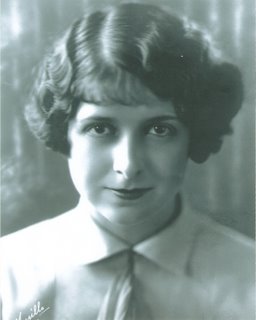 Evelyn May Potter in 1920; this photo was taken for Los Angeles radio station, KFI, from which Evelyn's piano playing was broadcast.
Evelyn May Potter in 1920; this photo was taken for Los Angeles radio station, KFI, from which Evelyn's piano playing was broadcast.EVELYN MAY POTTER was born on September 17, 1904 in Los Angeles, California. She was one of two daughters born to Milo Dock Potter of Wahoo, Nebraska and Pearl Jessie Rose of Westphalia, Kansas.
From Barbara Jean Smith Parker, Evelyn's daughter:
"It all started with Elbert and Harriet Pinney. They came to California and brought their daughter Emily May along with her children in a covered wagon to Pacoima, California. Once here, Emily and her children planted oranges and had one of the first groves in the area. Grandma (Pearl Jessie Rose) told me that they planted seeds and grew the trees that way. Great Grampa (Dr. Elbert) Pinney settled in San Gabriel, Sierra Madre. There is still a large Victorian house there on Lima Street that he built and lived in. He was a doctor during the Civil War before they came to California, where he continued his practice and worked with Luther Burbank on several projects.
Pearl met Milo Dock Potter when she was 15 and he was 19. He gave her a small ruby engagement ring and they went together for a while before they were married. They married on 9 April, 1902, in San Fernando, California. They had two daughters, Lucille and Evelyn.
The girls grew up in Porterville, Visalia, and Exeter, California. I believe that they lived most of the childhood in Exeter with summers spent at great grandmother Emily’s house in Long Beach, Ca. She lived on only 4 blocks from the ocean so it was a cooler place than where they lived."
 "There is a story about this picture (above). Evelyn has on a necklace of pearls and Lucille was upset because she wanted to wear them! This picture was taken in Exeter on the wooden porch in front of the house. The house was really a tent with partial wooden sides and wooden floor. The rest of the sides and roof were canvas. It had a wooden stove so it kept them toasty warm in the winter. Grandpa worked for the railroad and the house was furnished by the company."
"There is a story about this picture (above). Evelyn has on a necklace of pearls and Lucille was upset because she wanted to wear them! This picture was taken in Exeter on the wooden porch in front of the house. The house was really a tent with partial wooden sides and wooden floor. The rest of the sides and roof were canvas. It had a wooden stove so it kept them toasty warm in the winter. Grandpa worked for the railroad and the house was furnished by the company."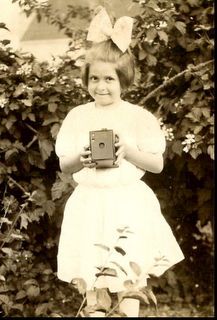
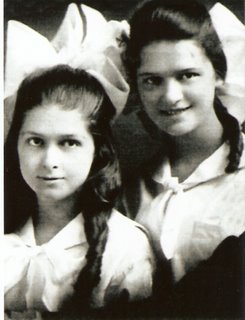 Evelyn (left) and her sister, Lucille
Evelyn (left) and her sister, Lucille Four Generations
Four GenerationsFrom left, Lucille Potter, Pearl Rose, Emily May Pinney, Evelyn (youngest), Harriet Young Pinney
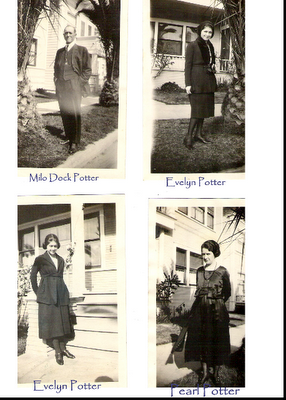
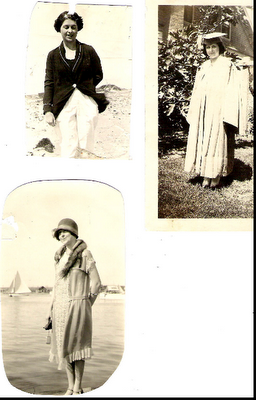
"When the family moved to Long Beach in 1919, they lived in one of the first houses in Belmont Shore. The address was 4509 E Ocean Blvd. Grandpa had 2 lots, for which he paid 200.00 dollars each. He built a duplex so that the family could live on one side and rent the other. It was small, only 1 bedroom. The girls slept on a Murphy bed in the living room. There was only 1 closet (and is was not very large), but they managed. Evelyn's sister, Lucille, was 1 1/2 years older than Evelyn, but they were in the same class in high school. They both graduated from Poly (Long Beach Polytechnic) High School in 1922. Evelyn was an accomplished pianist and in 1923, she purchased a piano with the money she earned from giving lessons on the small piano in her family's home. The new (used) one was a Cable-Nelson baby grand. It is still in the family. Evelyn took lessons from Abby DeAveritt in downtown Long Beach. He was one of the foremost teachers of piano in the west at the time.
The cost of one lesson was twenty five dollars, which was a lot then. Because of her training and ability she was asked many times to play on the radio. This was quite an honor at that time."
 "These are her piano students in 1924. Evelyn is third from the right in the top row. Grandpa built the rock fishpond that they are standing on. (Notice the sparseness of houses in the background.)
"These are her piano students in 1924. Evelyn is third from the right in the top row. Grandpa built the rock fishpond that they are standing on. (Notice the sparseness of houses in the background.)Evelyn had a cedar chest (hope chest) that Grandpa (Milo Dock Potter) had purchased for her. He took the red car (trolley) from Long Beach to Los Angeles and carried it all the way on his back from the store to home. Grandpa worked on the electric (or red) cars. Once, while he was working on top of one, he took hold of the wrong part and it sent such a shock through him it threw him off of the top of the car and all of his hair fell out. That is why he was bald. (At least, that is the story that is told.)
In 1926, Evelyn met Walter Hirst Smith, the son of a Long Beach realtor (Percy Hirst Smith). The romance took some twists and turns. Walter was the only son and the middle child of Percy and Bessie Smith. He had two sisters, Dorothy (older) and Winifred, the youngest. He went to private schools and owned a roadster and a sailboat. After high school, he went to work for his father in the real estate business."
 Evelyn on her wedding day, 1928
Evelyn on her wedding day, 1928 Walter Hirst Smith
Walter Hirst Smith
On November 10, 1928, Evelyn married Walter Hirst Smith of Long Beach, California. They were married in the All Saints Presbyterian Church in San Diego, California.
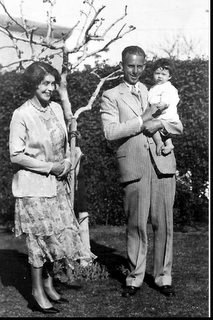 Evelyn, Walter and little Barbara Jean
Evelyn, Walter and little Barbara JeanThe Smiths moved to Long Beach, where they gave birth to two daughters, Barbara Jean and Elizabeth Ann.
 Barbara, Betty, and Evelyn, 1946
Barbara, Betty, and Evelyn, 1946In 1942, Evelyn married Jeff Coles. They were married for 5 years. Evelyn was a very talented musician and continued learning new instruments throughout her life. Barbara remembers that around 1944 or 1945, her mother purchased a harp from a Mr. Laughton, a harp maker in the Hollywood Hills. (He made the harp by hand and lived behind the Hollywood Bowl. His son [I believe his name was Denizel Gail Laughton] played for Harpo Marx's parts in some movies of the time.) Evelyn decided to take up the harp, and began taking lessons, even though her duties as a young mother were surely quite time-consuming.

 Evelyn and Jeff Coles on their honeymoon (Catalina Island).
Evelyn and Jeff Coles on their honeymoon (Catalina Island).Later in life, she and Walter were back together. Walter and Evelyn lived out their years near their daughter, Barbara, and many of their great-grandchildren, in Orange, California. Evelyn died on 6 October 1989, in Orange, California.
Subscribe to:
Comments (Atom)




